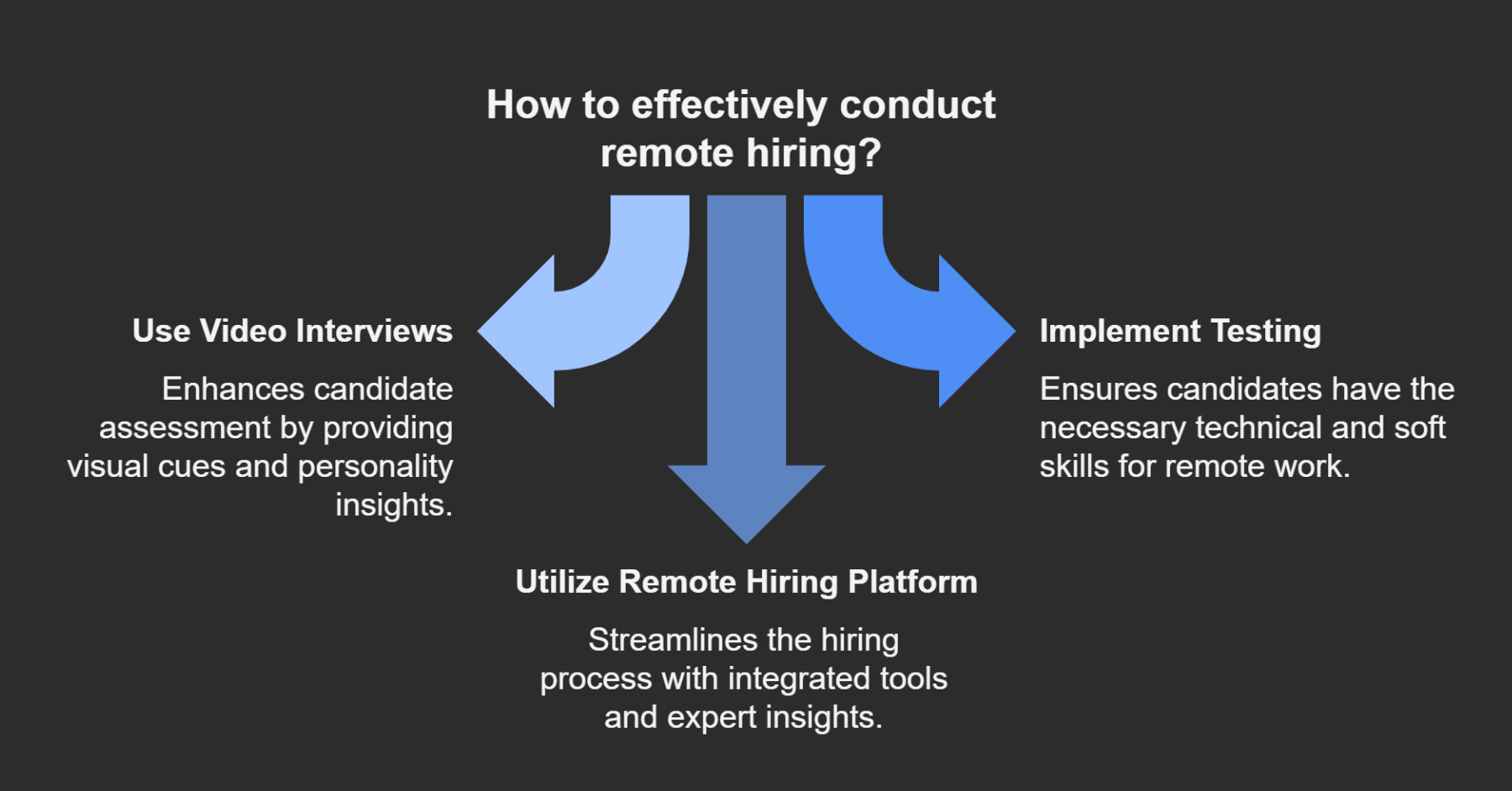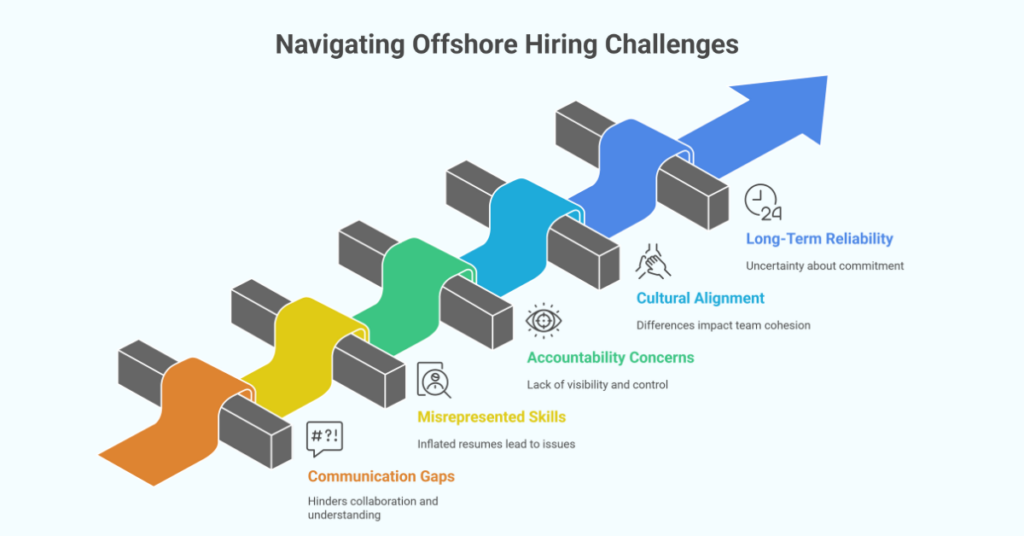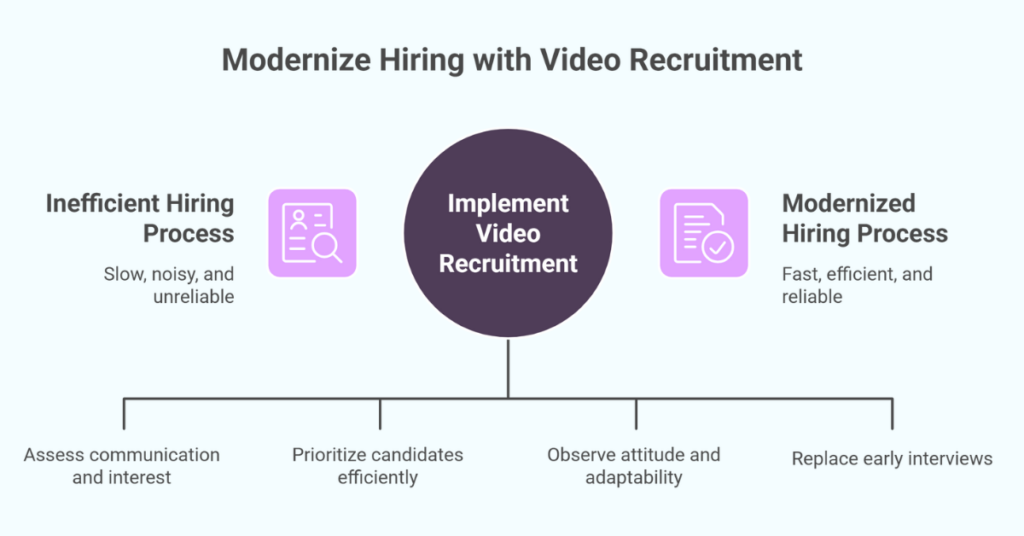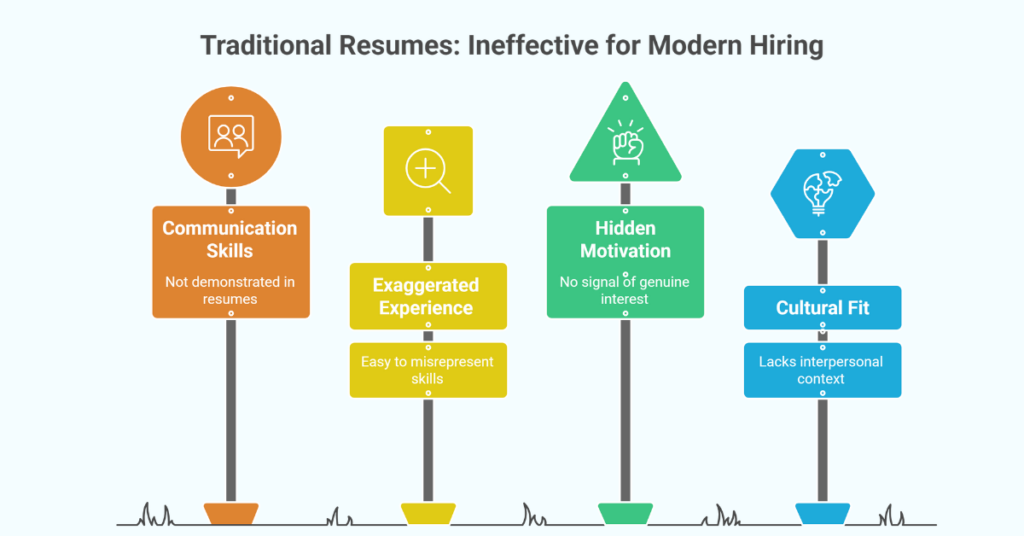“Remote hiring solutions empower companies to overcome the challenges of virtual recruitment, using technology to connect with exceptional global talent.”
In today’s digital era, finding and hiring top talent from around the world can be both an opportunity and a challenge. Remote hiring solutions have emerged as a crucial strategy for companies seeking to expand their workforce beyond local boundaries. Unlike traditional in-person recruitment, remote hiring requires companies to take significant leaps of faith, as they often rely on limited cues from digital interactions. Recruiting remotely poses challenges such as evaluating a candidate’s cultural fit and soft skills without face-to-face meetings. However, with the right strategies and advanced tools, businesses can overcome these hurdles. Remote hiring solutions incorporate video interviews, online assessments, and specialized recruitment platforms to streamline the process. By integrating these solutions, employers can pre-screen candidates effectively, conduct meaningful video interviews, and test candidates’ abilities in a manner that mirrors real-world tasks. Additionally, platforms built by remote employers offer tailored features that address the unique demands of hiring in a virtual environment. This guide delves into why remote hiring is complex, how video and testing play essential roles, and how a purpose-built remote recruitment platform like Remote Recruit can revolutionize your hiring strategy.
1. Why Remote Hiring is So Difficult
Remote hiring is inherently more challenging than in-person recruitment due to the absence of direct, personal interaction.
-
Limited Personal Interaction:
When hiring remotely, employers are unable to physically meet candidates, making it difficult to assess personality, cultural fit, and interpersonal skills. The digital medium often obscures non-verbal cues and nuances that are easily observed in face-to-face interviews, thus requiring recruiters to rely on limited data. This lack of physical presence means that hiring managers must depend heavily on resumes, video screenings, and online assessments, which may not fully capture a candidate’s potential for integration and performance within the company culture. Such limitations increase the risk involved in hiring decisions, as vital relational dynamics can be overlooked. -
Higher Reliance on Digital Communication:
Digital communication tools are essential but can often result in misinterpretations and lack the warmth of in-person dialogue. The absence of physical cues means that tone, empathy, and cultural context can be lost, leading to misunderstandings during initial screening phases. This creates a gap in accurately assessing how well a candidate may perform in a collaborative, real-world setting. Employers must therefore invest extra time and resources in establishing communication protocols and training their recruitment teams to interpret digital cues effectively. The challenge is compounded when teams are geographically dispersed, leading to potential delays and disparities in understanding between recruiters and candidates.
2. The Necessity of Video in Remote Hiring
Video is a critical component in remote hiring as it provides a richer, more realistic view of a candidate’s capabilities compared to text-based applications.
-
Enhanced Candidate Pre-Screening:
Using video interviews helps employers gauge a candidate’s communication skills, confidence, and overall suitability much more effectively than through a simple resume. Video pre-screening enables a more dynamic interaction where facial expressions and body language can provide insights into a candidate’s professionalism. This method allows recruiters to conduct more in-depth initial assessments and to shortlist applicants who demonstrate the desired soft skills and technological proficiency. By incorporating video, companies can significantly reduce the ambiguity inherent in remote hiring, thus making informed decisions faster. -
Increased Engagement and Authenticity:
Video interviews create a platform for candidates to express their personality and professionalism in a more natural manner. Unlike written applications, a video allows you to see the candidate’s energy, enthusiasm, and potential cultural fit, which are crucial for remote work environments. This visual element contributes to a higher engagement level during the hiring process, ensuring that candidates come across as genuine and personable. Employers benefit by receiving a more complete picture of the applicant, reducing uncertainty and building trust even before an in-person meeting occurs. The result is a more efficient screening process that leads to better hiring outcomes.
3. The Importance of Testing in Remote Recruitment
Robust testing is essential for remote recruitment, compensating for the challenges that arise from a lack of direct interaction.
-
Assessing Technical Skills Effectively:
Remote hiring requires thorough testing of candidates’ technical abilities to ensure they can perform the job tasks without direct supervision. Utilizing standardized tests and practical tasks allows employers to evaluate proficiency and problem-solving skills accurately. This method provides quantitative data that can be compared across candidates, ensuring consistency in evaluation. By using structured assessments, businesses can filter out less capable candidates early in the process. The approach not only minimizes risk but also helps to validate the candidate’s ability to work independently in a remote environment. -
Evaluating Soft Skills and Remote Readiness:
Beyond technical proficiency, remote jobs demand high levels of self-discipline and effective communication. Online tests and scenario-based assessments help measure these essential soft skills, ensuring that candidates are capable of thriving in a remote setup. Through well-designed tests, employers can observe responses that reflect real-life problem-solving and teamwork capabilities. This additional layer of evaluation helps bridge the gap between digital interactions and actual job performance. Such assessments are critical to ensuring that only those who are truly prepared for remote work are selected, thereby reducing turnover and enhancing team cohesion.
4. The Unique Advantage of a Remote Hiring Platform Built by Remote Employers
A specialized remote recruitment platform provides solutions tailored to the unique challenges of hiring virtually.
-
Platform Built by Experts:
A remote hiring platform developed by remote employers offers insights derived from real-world remote hiring experiences. These platforms are designed to handle the nuances of global hiring—from compliance with international labor laws to effective digital interviews. They incorporate features that streamline the entire recruitment process, reducing time-to-hire while ensuring that only qualified candidates are presented. The design is inherently user-centric, focusing on transparency, efficiency, and ease-of-use, thereby meeting the specific needs of remote teams. -
Integrated Tools for Seamless Recruitment:
These platforms often include integrated tools such as video interviewing, digital assessments, and AI-powered analytics that help recruiters quickly identify top talent. They eliminate the need for multiple disconnected systems, thereby reducing administrative burdens and improving coordination. With features such as candidate scoring, automated follow-up, and compliance monitoring, the remote hiring process becomes both faster and more reliable. This creates a seamless experience for both employers and candidates, significantly improving the overall success rate of remote hiring initiatives.
Overview: Key Elements of Remote Hiring Solutions
-
What are Remote Hiring Solutions?
They are digital tools and services designed to support the entire remote recruitment process, from sourcing to onboarding, in a manner that overcomes the limitations of in-person hiring. -
Why Are They Essential?
They provide access to a global talent pool, streamline candidate screening with video and testing, and improve overall hiring efficiency while managing risks associated with remote recruitment. -
How Do They Work?
These solutions integrate job boards, video interview tools, skill assessments, and compliance features into a single platform to automate and enhance the remote hiring process. -
Key Benefits:
-
Reduced time-to-hire
-
Enhanced candidate assessment
-
Lower recruitment costs
-
Improved legal and compliance management
-
-
How to Select the Right Solution:
Evaluate features, ease-of-use, integration capabilities, and support services to match your company’s specific remote hiring needs.
Solutions Provided by Remote Recruit
Remote Recruit is a specialized platform designed to streamline the remote hiring process for companies seeking top global talent. For employers, Remote Recruit offers advanced AI-driven candidate matching, video interview capabilities, and comprehensive screening tools that significantly reduce the risk and time associated with remote hiring. The platform provides features that simplify compliance with international labor laws and ensures that all remote candidates are assessed thoroughly using standardized tests. This creates a seamless, efficient hiring experience that saves money and improves the quality of hires.
For job seekers, Remote Recruit offers a modern interface to create detailed profiles, upload video resumes, and receive personalized job recommendations, making it easier to secure high-quality remote positions. With its robust toolset and focus on the nuances of remote work, Remote Recruit stands out as a vital resource for both employers and candidates aiming to thrive in a global remote workforce.
Conclusion
Global remote hiring solutions are transforming the recruitment landscape, enabling companies to overcome traditional hiring limitations and access a diverse, worldwide talent pool. By addressing key challenges such as reduced personal interaction and the need for comprehensive candidate screening through video interviews and testing, these solutions pave the way for faster, more efficient hiring processes. Specially designed platforms, like those developed by remote employers for remote employers, provide tailored features that ensure compliance, enhance communication, and safeguard intellectual property. For companies, this means lower hiring costs, improved productivity, and the ability to scale quickly without geographic limitations. For job seekers, such solutions open the door to a multitude of opportunities, offering flexibility and the chance to showcase their skills in an innovative format. Investing in these advanced remote hiring solutions not only drives success in recruitment but also builds a resilient and agile workforce prepared for the future of work.
Transform your hiring process and unlock global talent—sign up on Remote Recruit today and build your dream team effortlessly.
Frequently Asked Questions (FAQs)
1. What are remote hiring solutions?
Remote hiring solutions are digital platforms and tools designed to help companies recruit, screen, and onboard remote employees, overcoming challenges like communication gaps, legal compliance, and cultural differences. These solutions streamline the hiring process through AI-driven assessments, video interviews, and integrated compliance management, making it easier to hire globally.
2. Why is video essential in remote hiring?
Video interviews allow employers to better gauge a candidate’s communication skills, personality, and overall fit by providing visual and contextual cues that are often missing in resume-based evaluations. They also help bridge the gap in remote interactions, reducing the risk inherent in not meeting candidates in person, and contribute to more confident, data-driven hiring decisions.
3. How do tests improve the remote hiring process?
Testing candidates online helps verify their technical abilities, problem-solving skills, and aptitude for working remotely. By incorporating standardized assessments, employers can objectively compare skill levels and ensure that only those with the required competencies move forward in the selection process, thereby minimizing hiring risks.
4. What makes a remote hiring platform effective for tech companies?
An effective remote hiring platform integrates features like AI-powered candidate matching, video interview functionality, and compliance support, specifically tailored for remote work. It ensures that both technical and soft skills are thoroughly evaluated, which is essential for building high-performing, globally distributed teams.
5. How does Remote Recruit help streamline remote hiring?
Remote Recruit offers a comprehensive suite of hiring tools, including automated candidate screening, video interviews, and compliance solutions, all designed to reduce the complexity and risk of hiring remote talent. Its AI-driven platform matches candidates with the right roles and supports seamless onboarding, making it easier for employers to build effective remote teams.
